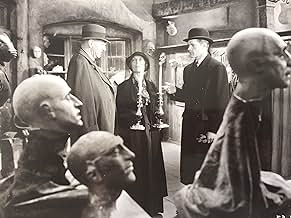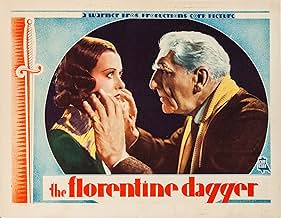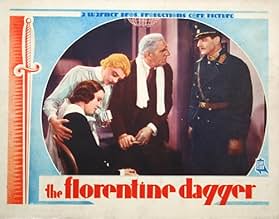The Florentine Dagger is a strange little film full of atmosphere, but lacking the acting punch that might have put it over. A story of the curse of the Borgias in modern-day Vienna opens with three travelers (Donald Woods, C. Aubrey Smith, and Henry O'Neill) making a trip to a remote village in Italy where the Borgia castle still stands. The old inn is full of atmosphere and run my strange people (Charles Judels, Rafaella Ottiano). They take a tour which allows the viewer to be given the story of the Borgias' madness and its generational effects. Woods is Casare Borgia, the spitting image of an ancient ancestor (although the name is pronounced Cesar throughout the film). Woods decides to end the madness and orders a drug from the local apothecary. However, Smith (a psychiatrist) intervenes and tells Woods that the potion is fake. O'Neill is a famous theatrical producer. So Smith advises that Woods write a play and purge his Borgia madness. Of course Woods writes a play about Lucretia Borgia, which O'Neill produces. He also casts his "daughter" in the lead (Margaret Lindsay). The play is the talk of Vienna.
Woods and Lindsay fall in love, but O'Neill is stabbed to death with one of the three Florentine daggers we had seen displayed earlier. Woods becomes the main suspect because of his erratic behavior and he is, after all, a Borgia. But Lindsay seems a tad off also. And Smith is always lurking. Enter the local inspector (Robert Barrat), a happy fellow who seems totally uninvolved with the murder case and is always receiving phone calls from Julia. Lindsay had left the play in a rush and is jailed on suspicion of murder. But then there is another dagger attackthis time on Smith. That clears Lindsay. Or does it? The police had let her go. Woods and Smith end up at an auction house, following a wigmaker (Eily Malyon) who buys the candle sticks that were found by O'Neill's body. Everyone converges at the wigmaker's shop and the crime is solved. All very tidy and clever. Barrat threatens to steal the film from the more stolid actors, but his character is too unbelievable, especially as he lets the murderer go free! Go figure.
Paul Porcasi is a police man, Henry Kolker is the auctioneer, Florence Fair is the weird maid, Herman Bing (who has no part) is the baker, Louise Seidel is his assistant, and Frank Reicher is the stage manager. Woods is boring, Lindsay is miscast, and Smith is relatively subdued. Only Barrat and Malyon seem to have much life. Judels serves as the castle your host, but Ottiano seems irrelevant to the story. Makes one wonder about the editing here as Ottiano and Bing have no reasons to be in the story. And the play is a STINKER!

























